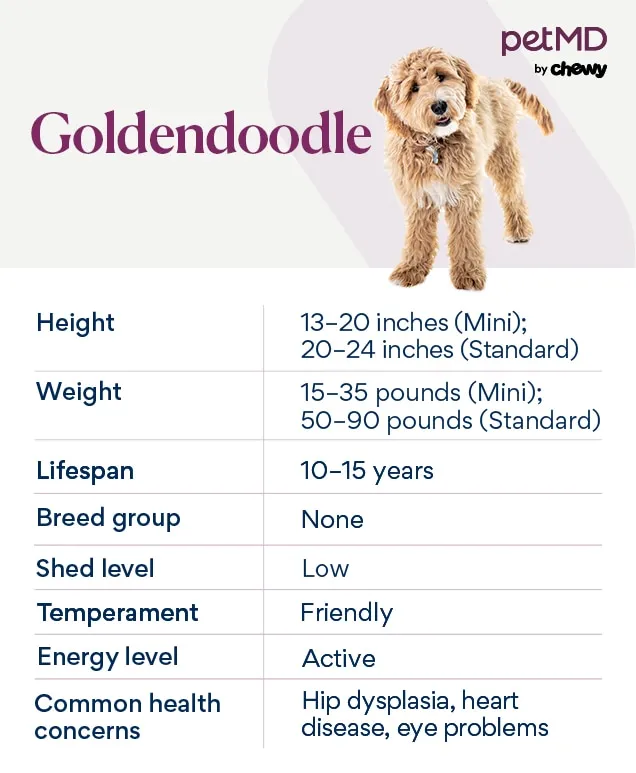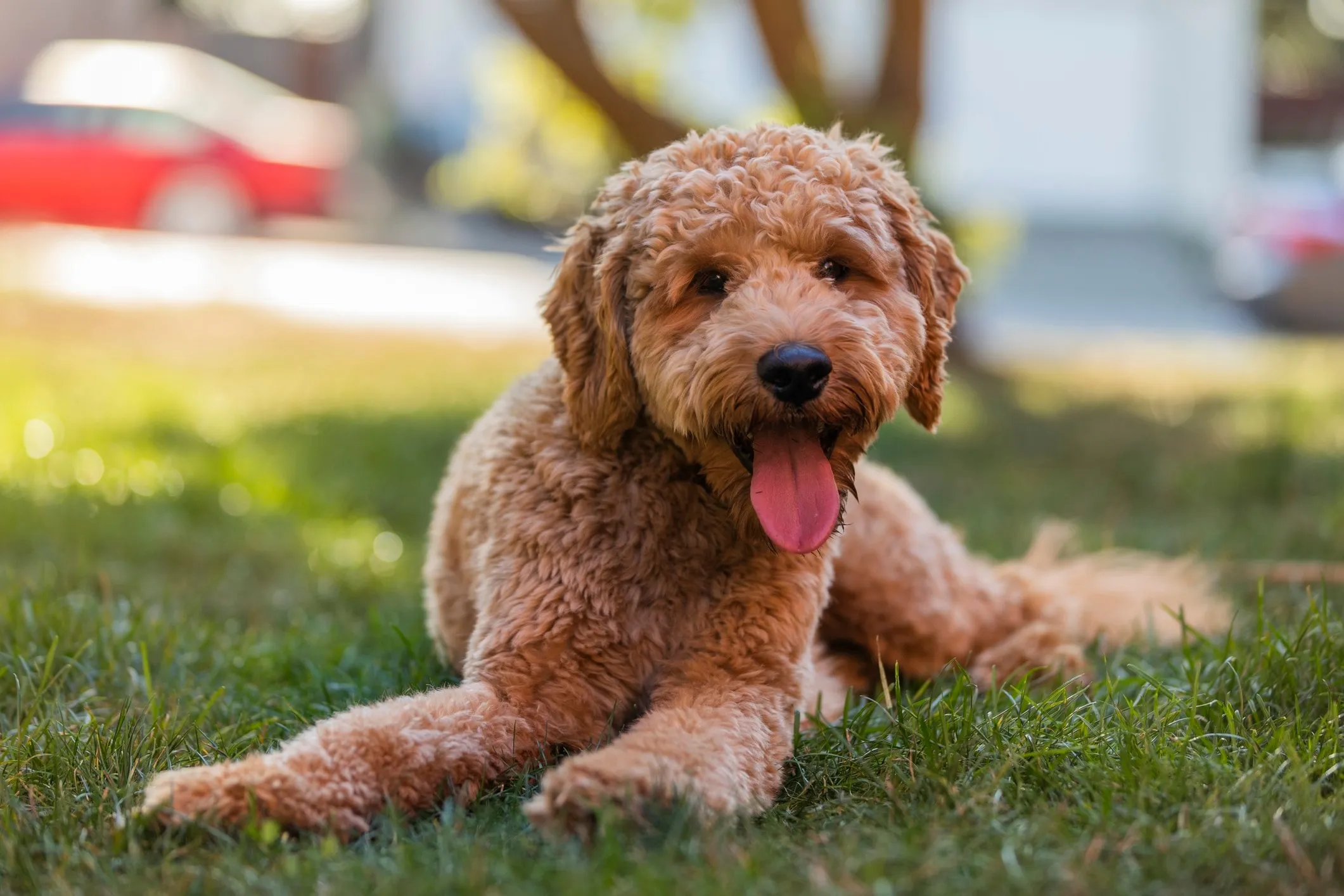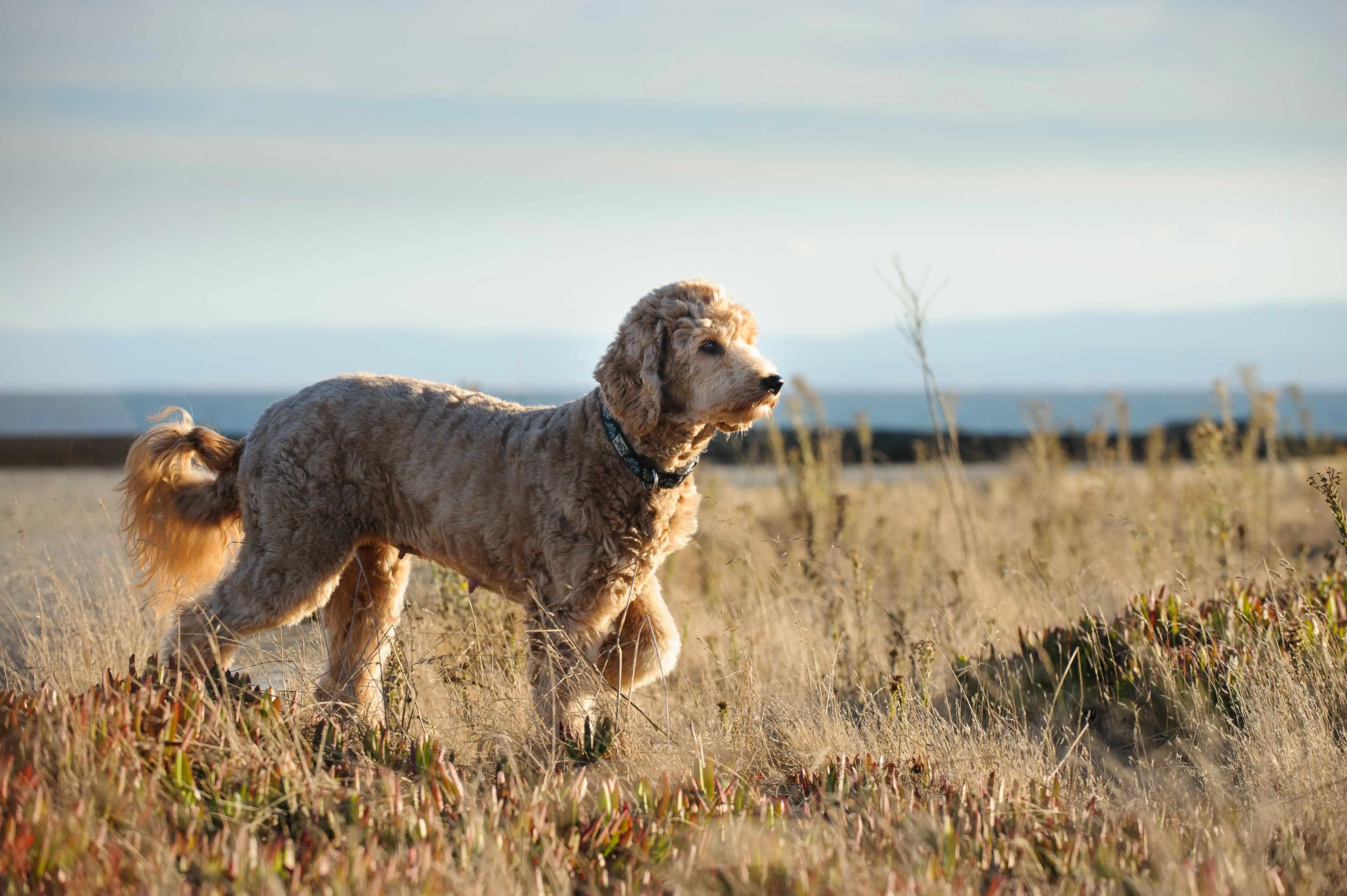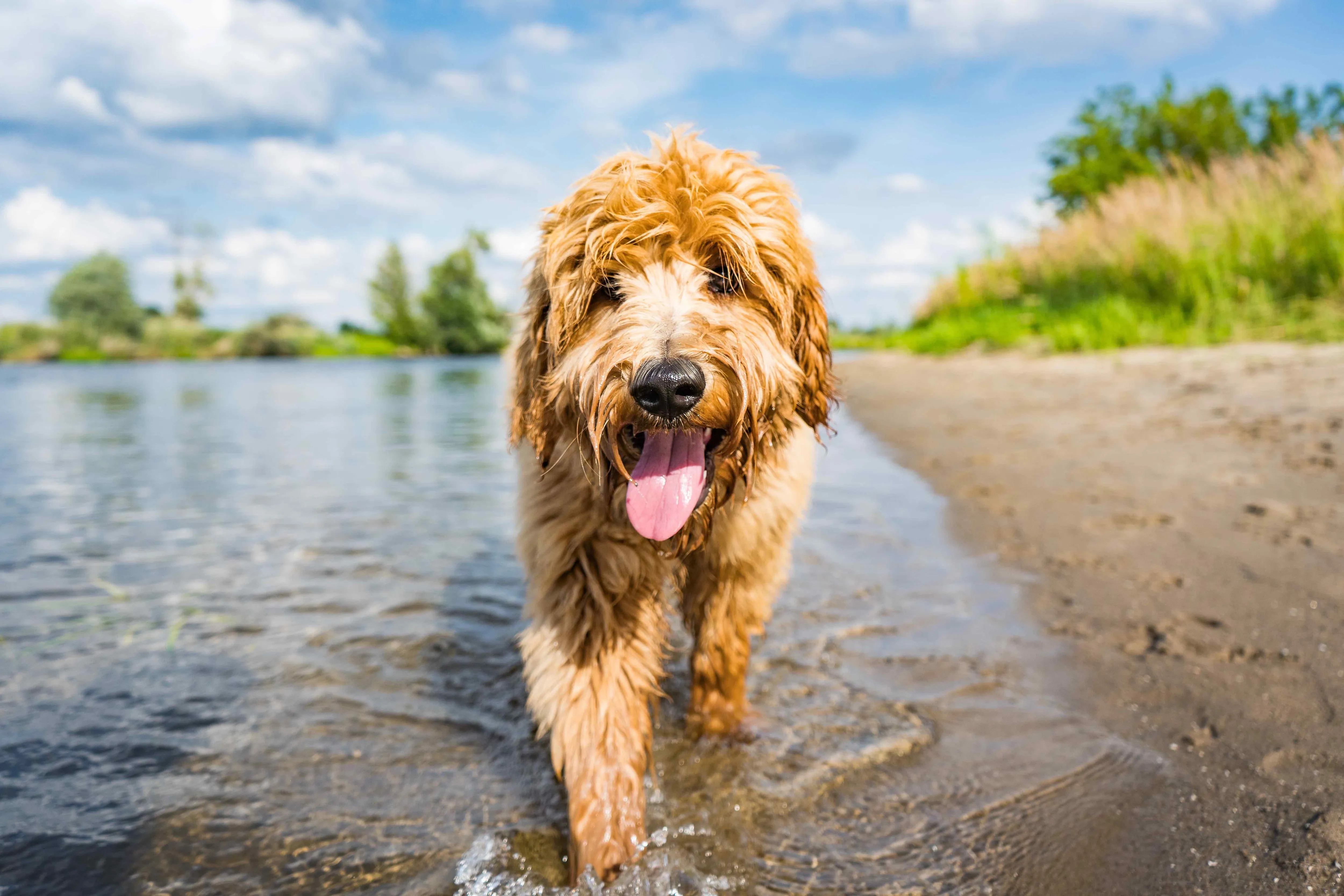The Goldendoodle, a charming crossbreed of a Golden Retriever and a Poodle, first emerged in the late 1960s as a guide dog. By the 1990s, they had cemented their place as beloved family pets in the United States, cherished for their low-shedding qualities, intelligent and highly trainable personalities, and patient, family-friendly disposition. These wonderful companions thrive when given proper care and attention, making comprehensive Goldendoodle Care essential for their well-being. Whether you’re a new owner or looking to enhance your current approach, this guide will provide crucial insights to ensure your furry friend lives a happy and healthy life. For more insights on becoming a dedicated dog carer, explore our specialized resources.
Understanding Your Goldendoodle: Personality and Needs
Goldendoodles are selectively bred to embody the finest characteristics of both the Golden Retriever and the Poodle, resulting in an exceptionally smart and fun-loving dog. Their intelligence makes them excel in activities like obedience classes and agility training, making them a joy to train. These adaptable dogs typically integrate well into households with other dogs, cats, and children. However, their strong bond with their human family means they can be prone to separation anxiety if left alone for extended periods—more than eight hours. Pet parents must ensure their Goldendoodle receives ample daily social activity and mental stimulation to prevent such issues. This dedicated approach to “goldendoodle care” helps them flourish as well-adjusted members of the family.
 Chart depicting Goldendoodle dog breed traits
Chart depicting Goldendoodle dog breed traits
Standard Goldendoodles can reach 20–24 inches tall and weigh 50–90 pounds, while Mini Goldendoodles offer a smaller alternative, depending on whether their Poodle parent was a Standard or Miniature Poodle. Regardless of size, all Goldendoodles require consistent attention to their unique needs. Providing a stimulating environment and plenty of companionship is paramount for their emotional health, preventing behavioral issues that can arise from boredom or loneliness.
Essential Goldendoodle Health Care
Goldendoodles are generally healthy dogs with an average lifespan of 10–15 years. However, they are susceptible to common health conditions inherited from both Poodles and Golden Retrievers. While you cannot guarantee a dog free from health problems, purchasing your Goldendoodle puppy from a reputable breeder significantly reduces risks. Dr. Jamie Whittenburg, a veterinarian at Kingsgate Animal Hospital, emphasizes that breeders should conduct thorough testing on their breeding stock, including OFA or PennHip testing for hips, echocardiograms with a cardiologist, and extensive genetic testing prior to breeding. This proactive approach to health screening is a critical component of responsible “goldendoodle care.”
Addressing Hip Dysplasia in Goldendoodles
Hip dysplasia is a prevalent condition in large- and giant-breed dogs, occurring when the hip joint develops abnormally, leading to a loose joint. This can manifest during a Goldendoodle puppy’s growth phase. Dogs suffering from hip dysplasia often exhibit discomfort through limited mobility, such as reduced activity, difficulty climbing stairs, or trouble simply getting up. Various treatment options are available, ranging from joint supplements and anti-inflammatory medications to surgical interventions. It is crucial to consult your veterinarian to determine the best treatment plan for your Goldendoodle. Left untreated, hip dysplasia can progress to painful arthritis in dogs, severely impacting their quality of life.
Understanding Goldendoodle Heart Disease
Goldendoodles are genetically predisposed to certain heart diseases, notably a congenital variation known as subvalvular aortic stenosis (SAS). This condition involves a narrowing of the heart’s aortic valve, creating an obstruction. As Dr. Whittenburg explains, the heart must work harder to pump blood through this constricted area, which can lead to abnormalities in the heart muscle. While there are no specific foods or lifestyle changes that can prevent an inherited heart defect, prospective owners should always inquire with their Goldendoodle breeder about whether the puppies’ parents have been screened for heart disease. Symptoms to watch for include difficulty breathing and a sudden loss of consciousness, known as syncope.
Managing Eye Issues: Glaucoma, Cataracts, and PRA
Goldendoodles are susceptible to three primary eye conditions: glaucoma, cataracts, and progressive retinal atrophy (PRA). Each requires vigilant monitoring as part of comprehensive “goldendoodle care.”
Glaucoma is an eye disease characterized by increased pressure within the eye. Pet parents should look for symptoms such as bulging eyeballs, watery discharge, redness in the whites of the eyes, and dilated pupils. This condition can be managed with long-term medication, but if left untreated, glaucoma can lead to irreversible blindness in dogs.
Cataracts are a common condition causing clouding in the eyes, which can result in vision loss. If you observe a cloudy or opaque appearance in one or both of your Goldendoodle’s eye lenses, or if their vision seems impaired, consult a veterinary professional immediately. Cataracts can often be effectively treated with surgery.
Progressive Retinal Atrophy (PRA) is a degenerative condition where the eye’s retina gradually breaks down, ultimately leading to blindness. Unfortunately, there is no known cure for PRA. Early symptoms may include night blindness or a reluctance to navigate in the dark, increased clumsiness, and the development of cataracts.
Preventing Gastric Dilatation-Volvulus (GDV)
Gastric dilatation-volvulus (GDV) is a severe form of bloat in dogs, a life-threatening medical emergency where a dog’s stomach inflates with food and gas and then twists. This twisting cuts off blood flow to and from the stomach and spleen, requiring immediate veterinary intervention. Breeds with deep chests, such as Standard Poodles, are more prone to developing bloat and GDV, which places larger Goldendoodles at a potential risk.
Seek emergency veterinary care immediately if you notice any of these signs of GDV in your Goldendoodle:
- Retching without vomiting
- Pacing or restlessness
- Excessive drooling
- A distended or swollen abdomen
This condition progresses rapidly, and prompt action can be life-saving.
Optimal Nutrition for Your Goldendoodle
Proper nutrition is a cornerstone of effective goldendoodle care. Feed your Goldendoodle a dog food that meets the nutritional standards set by the Association of American Feed Control Officials (AAFCO). Reputable brands often include Purina Pro Plan, Hill’s Science Diet, and Royal Canin. It is always best to discuss your Goldendoodle’s specific dietary needs with your veterinarian. They can help you select the best dog food formulated for their life stage—whether they are a puppy, adult, or senior—and address any unique health considerations.
 Goldendoodle dog lying in grass with his tongue out, looking at the camera
Goldendoodle dog lying in grass with his tongue out, looking at the camera
Effective Feeding Practices for Goldendoodles
Maintaining your dog at a healthy weight is vital, as obesity in dogs can exacerbate existing health issues and lead to new ones. Goldendoodles should typically be fed two measured meals twice a day. Goldendoodle puppies, however, may benefit from more frequent meals, up to four times daily, to support their rapid growth and energy needs.
To reduce the risk of life-threatening GDV during feeding, consider these important steps:
- Do not allow your dog to engage in strenuous exercise for one to two hours before or after eating.
- Avoid using elevated food bowls, as this has been linked to an increased risk of bloat in some breeds.
- Utilize a slow feeder bowl, snuffle mat, or puzzle toy to encourage slower eating, which helps prevent excessive air intake and bloat.
- Distribute your dog’s daily food intake into multiple smaller meals throughout the day, rather than one large meal, to minimize the risk of bloat.
Nutritional Supplements and Treats
For Goldendoodles fed a complete and balanced commercial dog food diet, nutritional supplements are generally not necessary unless specifically recommended by a veterinarian. A high-quality diet tailored to their life stage (puppy, adult, or senior) should provide all the essential nutrients. Dog treats should be given in moderation, making up no more than 10% of your Goldendoodle’s daily calorie intake, and should never be used as a replacement for regular meals. Responsible treat giving is another key aspect of proper “goldendoodle care.”
Training and Behavior Management for Goldendoodles
The Goldendoodle personality makes them excellent family dogs, capable of living harmoniously in homes with other dogs. Dr. Sophie Whoriskey, associate director at Hawai’i Conservation Medicine, notes that they are also generally good with cats and children, although an initial adjustment period may be needed for them to get used to new family members. Both Standard and Miniature Goldendoodles are energetic dogs, requiring 30–60 minutes of physical exercise daily. This can be a combination of activities such as neighborhood walks, runs, hikes, and engaging playtime.
 Goldendoodle dog lying on a human bed
Goldendoodle dog lying on a human bed
Addressing Goldendoodle Behavior Challenges
Because Goldendoodles deeply cherish time spent with their families, they can develop separation anxiety if they do not receive adequate social and mental stimulation. Pet parents should strive to avoid leaving their Goldendoodle alone at home for extended periods. Strategies like crate training, hiring a reputable pet sitter, or engaging a dog walker can be highly effective in managing and mitigating separation anxiety. While these laid-back canines are not typically excessive barkers, they may become vocal to alert their humans to something unusual. Overall, Goldendoodles are celebrated for their gentle temperament, making them ideal companions for households with children and seniors. Dr. Whoriskey emphasizes, “They especially benefit from having a strong bond with their human family and being part of the daily routine.” This strong bond is a fundamental aspect of nurturing “goldendoodle care.”
Smart Training Strategies for Your Goldendoodle
Despite the typical Goldendoodle’s friendly disposition, socializing your puppy is crucial for their development into a confident and well-adjusted adult dog. Socializing a Goldendoodle puppy involves carefully exposing your dog to a variety of new stimuli, environments, people, and other animals so they become comfortable and resilient in new situations. Goldendoodles are renowned for their intelligence and ease of training, excelling in activities like agility and obedience classes. They respond exceptionally well to positive reinforcement techniques, where desirable behaviors are rewarded with treats, praise, or toys. It is also important to begin training Goldendoodle puppies at a very young age to establish good habits that will last a lifetime and minimize the development of mischievous behaviors. As Dr. Whoriskey advises, “With patience and consistency, you will be able to teach your Goldendoodle many tricks and commands.”
Fun Activities to Engage Your Goldendoodle
Keeping your Goldendoodle physically and mentally stimulated is a vital part of “goldendoodle care.” Here are some engaging activities they typically enjoy:
- Walking
- Obedience training
- Running
- Hiking
- Playing fetch
- Swimming
- Dock diving
- Tug-of-war
- Agility training
- Rally (dog sport)
- Hunting (for those with a strong Golden Retriever lineage and proper training)
- Cuddling with family
Comprehensive Goldendoodle Grooming Guide
Due to their unique heritage—a mix of Golden Retriever and Poodle—Goldendoodles are celebrated for their beautiful, curly or wavy coats that shed minimally. However, this appealing coat requires a high-maintenance hair care routine, including consistent at-home brushing and regular appointments with a professional groomer. Understanding and committing to this grooming regimen is paramount for proper “goldendoodle care.”
 Goldendoodle pointing in a field
Goldendoodle pointing in a field
Skin and Coat Care for Goldendoodles
While Goldendoodles do not typically require a strict regular bathing routine, your dog may benefit from a bath if they become particularly wet or dirty during outdoor adventures. Always use a dog-safe shampoo and consult your veterinarian about how often you should bathe your dog, as over-bathing can strip natural oils.
To prevent unruly tangles and painful matting, Goldendoodles need constant and regular grooming. Brush your dog at least a few times a week, ensuring you reach down to the skin. Mindy Waite, CAAB, CPDT-KA, a clinical assistant professor in animal behavior at Carroll University, stresses the importance of “training these dogs from a young age to allow for this consistent grooming is absolutely critical.” She also notes that “pet parents must be prepared to spend a good deal of money on grooming every four to eight weeks” for professional care. This consistent maintenance is key to keeping their coats healthy and comfortable.
Eye and Ear Care
As part of your Goldendoodle’s grooming, trim the hair around their eyes to prevent it from obstructing their vision and causing irritation. Given their predisposition to eye conditions such as glaucoma and cataracts, pet parents should also remain vigilant for any respective symptoms and contact their veterinarian if concerns arise. For ear care, always keep your Goldendoodle’s ears clean and dry, especially after baths or swims, to prevent infections. Consult your vet to determine if routine ear cleaning is necessary for your dog and to get recommendations on the best ear-cleaning products to use.
Maintaining Goldendoodle Dental Health
Daily dental care is a crucial yet often overlooked aspect of “goldendoodle care.” Brushing your dog’s teeth every day is the most effective way to combat dental disease, a common issue for all dogs, including smaller breeds like Mini Goldendoodles. Regular brushing with dog-safe dental tools helps prevent plaque and tartar buildup, which can lead to periodontal disease and other serious health problems. Your veterinarian can recommend the best toothbrushes and dental pastes for your Goldendoodle.
Important Considerations for Goldendoodle Owners
The Goldendoodle is a friendly, lively, and high-energy breed available in various sizes, making them an ideal companion for a wide range of households. While they appreciate a yard with space to run and play, their adaptable temperament also makes them a suitable fit for city apartments, provided they receive sufficient outdoor exercise. When welcoming a Goldendoodle puppy into your home, be prepared to provide them with consistent positive reinforcement training and ample attention. Goldendoodles require significant amounts of training and exercise daily, particularly during their formative puppy years, to remain entertained, mentally stimulated, and content, as emphasized by Waite. This dedication from a caring dog carer ensures a well-adjusted companion.
 Goldendoodle walking through a lake
Goldendoodle walking through a lake
Goldendoodle Care FAQs
Do Goldendoodles shed a lot?
No, Goldendoodles have a reputation for being “hypoallergenic” dogs because they shed minimally. However, it’s important to understand that no dog is 100% allergen-free. Pups that are 75% Standard Poodle and 25% Golden Retriever (known as an F1B Goldendoodle) inherit curlier Poodle coats, which can be a better option for allergy-sensitive individuals. The degree of sensitivity to dog allergens varies greatly among people, so it’s advisable to spend time with the breed before bringing a Goldendoodle puppy home.
How long do Goldendoodles live?
On average, the lifespan of a Goldendoodle ranges from 10 to 15 years. Generally, smaller dog breeds tend to live longer than larger dogs, meaning Miniature Goldendoodles typically have a longer life expectancy than their standard-sized counterparts.
Are Goldendoodles smart?
Yes, Goldendoodles are exceptionally smart dogs. Both of their parent breeds, the Golden Retriever and the Poodle, are consistently ranked among the smartest dog breeds, contributing to the Goldendoodle’s high intelligence and trainability.
Are Goldendoodles expensive?
Yes, Goldendoodles can be a significant financial investment. The average price of a Goldendoodle puppy can range from $1,500 to $5,000, influenced by factors such as the breeder’s reputation, the dog’s size, lineage, geographical location, and other considerations. Beyond the initial purchase, potential pet parents must also account for the ongoing costs of comprehensive “goldendoodle care,” including regular veterinary visits, professional grooming, training classes, high-quality food, and various supplies.
Goldendoodle vs. Labradoodle: What’s the Difference?
While both Goldendoodles and Labradoodles are popular “doodle dogs” known for their gentle natures, playful personalities, and low-shedding coats, they have distinct origins and characteristics. The Goldendoodle is a cross between a Golden Retriever and a Poodle, whereas the Labradoodle results from breeding a Labrador Retriever with a Poodle. Goldendoodles generally tend to have a longer lifespan and a slightly calmer energy level than Labradoodles, though both breeds require regular exercise to stay healthy and happy.
Providing comprehensive “goldendoodle care” requires dedication, patience, and a deep understanding of their unique needs. By focusing on their health, ensuring proper nutrition, engaging them with effective training and activities, and maintaining their grooming, you can ensure your Goldendoodle thrives as a cherished member of your family. This journey of caring for your Goldendoodle is incredibly rewarding, offering years of companionship and joy. For more expert advice and resources on caring for your canine companion, continue to explore Dog Care Story.
